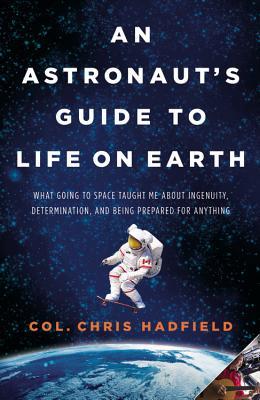 For me, this book was much like its author: completely off my radar until this year, 2016, when it was suddenly everywhere. This is strange because the book is copyrighted to 2013, and Hadfield himself completed his last space mission (the one he became well-known for) in 2013 as well. So why did this all suddenly come across my desk this year? I have no idea. And actually, I had no idea that the two (book and person) were connected until I Googled Hadfield and realized yes, I did know who this person was, though (again) I only became aware of him recently. He's the guy who made all those space videos! I would have figured this out if I'd just read the book, because he talks about making them, but it was nice knowing who was doing the talking as I went all the way through; it made it resonate more.
For me, this book was much like its author: completely off my radar until this year, 2016, when it was suddenly everywhere. This is strange because the book is copyrighted to 2013, and Hadfield himself completed his last space mission (the one he became well-known for) in 2013 as well. So why did this all suddenly come across my desk this year? I have no idea. And actually, I had no idea that the two (book and person) were connected until I Googled Hadfield and realized yes, I did know who this person was, though (again) I only became aware of him recently. He's the guy who made all those space videos! I would have figured this out if I'd just read the book, because he talks about making them, but it was nice knowing who was doing the talking as I went all the way through; it made it resonate more.So, I picked this up because a few people had it posted on lists of self improvement books, and that's a category I needed to fill for my reading challenge and one that sounded utterly awful because self improvement books as a rule are. While I don't think Hadfield intended this to be a self improvement book, I can definitely see why it's ended up being considered as one, in addition to being a cool autobiography and book about being an astronaut in general. The reason that it's floated into the SI sphere seems to be this: Hadfield has a lot of advice to offer without actually seeming like he's offering it, and definitely without shoving it down your throat. He's a very personable guy, someone I felt I could get along with even though we pretty much have nothing in common but speaking English. He uses his own experiences in his career, both on his path to become an astronaut and while he was "deployed" as one, to exhibit little mindsets and behaviors that really anyone can use for trying to improve life. He turns a lot of pithy little sayings on their heads; instead of "Don't sweat the small stuff," Hadfield thinks that you really should, at least in some situations, because those neglected little details can really come back around bite you later. Planning ahead isn't worrying over nothing, it's planning so that you know what you'll do if different things (such as problems caused by those little details you neglected) arise later. Striving to make zero impact gives you the opportunity to make a positive impact while also reducing the possibility that you'll make an ass of yourself trying to show off and make a positive one.
All of these little lessons are generally applicable to the population at large. I didn't see anything in here that was astronaut-specific. And that's the point, isn't it? I mean, it's not much of a guide to life on earth if you're only giving out info that astronauts can use. And all of these things are gently folded in among amusing, poignant, and sometimes heartbreaking stories about the joys, trials, and disasters that come with what is, really, an extremely dangerous occupation. Most of us don't have to worry about seven of our friends being blown up when their car loses a piece of insulation, as happened with Hadfield's friends and coworkers when the Columbia exploded in 2003, but we can still take the lessons he's learned from various points in his life and career and apply them to our own. It's also a rather quirky look at what being an astronaut is like, because most of us quite frankly have no idea, and I like that Hadfield was able to make it so much more real for the average person like me, who has absolutely zero chance of ever setting foot in space.
Overall, this was a fast, light read with some good stories and spot-on observations about life, and lessons that we can all learn from. I would have liked to know a bit about the other space missions Hadfield went on, in addition to the one to the ISS--he only briefly mentions them--but the ISS one was the longest by far so I can see why the focus was there.
4 stars out of 5.
No comments:
Post a Comment